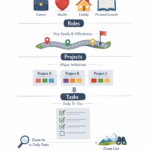
Burnout – My Tips to Avoid It

Burnout: The Silent Productivity Killer (And How to Avoid It)
We’ve all been there – overworked, overstressed, and running on fumes. Burnout can sneak up on you when you least expect it, zapping your motivation, energy, and effectiveness. Left unchecked, it can lead to serious mental and physical health issues.
But burnout doesn’t have to be an inevitability. By recognizing the warning signs early and taking preventative steps, you can avoid crashing and burning altogether. I hope that this post, will give you some practical strategies for steering clear of burnout, and understanding when your at risk of veering into the darkness!
What is Burnout?
The World Health Organization defines burnout as “a syndrome resulting from chronic workplace stress that has not been successfully managed.” The key dimensions are feelings of energy depletion, increased mental distance from one’s job, and reduced professional efficacy.
Burnout manifests in a variety of physical and psychological symptoms like fatigue, insomnia, anxiety, depression, and difficulty concentrating. A 2019 study found that burned-out employees were 63% more likely to take a sick day.
Recognize the Warning Signs

The first step is getting in tune with your body and mind’s signals that you may be careening towards burnout. Red flags to watch for include:
- Dreading work most days
- Feeling disengaged and cynical about your job
- Loss of enjoyment from activities you previously loved
- Physical symptoms like headaches or lingering illness
If you’re experiencing several of these consistently for weeks, then chances are you know something is wrong. But acknowledging the problem doesn’t always get you out of it. A lot of the time you can feel trapped, constantly turning up to a job that you’ve fallen out of love with. Especially with the job market as it is currently – definitely a recruiters market.
1.) Set Boundaries and Prioritize Health & Sleep

Making your health a priority and setting firm boundaries is crucial. This could mean leaving work at a reasonable hour, taking breaks every 90 minutes, saying no to non-essential requests, using paid vacation days, and carving out time for hobbies, exercise, and relationships. Sleep is another important thing to consider. I’ve recently been using a Garmin to track my sleep and log it in my journal entries. It has been an eye opener to understanding when I’m pushing myself to hard.
Needless to say it’s pretty clear when I’ve had not enough sleep and I’m just not functioning correctly. Working too many hours will reduce your amount, and quality of sleep and you’ll end up spiralling. This video by the better ideas YouTube channel shows this pretty clearly.
If you think this could be a problem – start tracking your sleep (apparently Garmin isn’t the best for this however – I just already had one for running).
2.) Gain Perspective on Your Problems Problems by Escaping to Nature

Without challenges to overcome, nothing we accomplish would feel meaningful. When we embrace problems as opportunities instead of avoiding them, we become more resilient. Research shows the ideal stress level for peak motivation is intermittent, not overwhelming.
One powerful antidote I’ve found is spending time in nature. Getting away from noise and surrounding yourself with greenery provides a potent shift in perspective. Nature reminds us that most daily stressors are insignificant. Even a short walk in the park works wonders for shedding stress and re-focusing on what matters most.
Our personality types may also play a role, with Type A’s potentially more prone to overdoing it. But staying cognizant of unhealthy mental patterns and consciously shifting out of them can insulate against burnout regardless of base personality.
And the research certainly backs up my experience with going into and not going into nature enough. Michael Easter talks about the affect nature has on your brain. Spending a small amount of time in nature changes the waves given off by your brain.
He also mentions the 20, 5, 3 rule which is: 20minutes outside each day, five hours in a natural setting each month, three days in a more wild, off-grid setting each year. This is a pretty easy system to follow and ensures you never tip the balance too far away from nature.
If there was one thing I could recommend to help burnout – nature is it.
3.) Unplug, Unwind, and Get Restorative Sleep

When’s the last time you truly disconnected from work? Unplugging and taking real vacations where you don’t check email is essential for recharging. Set an internet curfew 1-2 hours before bed to allow your mind to decompress.
Making restorative sleep a priority is also absolutely vital. Getting under 6 hours per night is one of the biggest risk factors for burnout. Prioritize sleep hygiene by sticking to a consistent bedtime, avoiding screens before bed, and keeping your bedroom conducive to quality rest.
Burnout often creeps up through accumulated sleep debt until you hit a breaking point. Get consistent, high-quality sleep, and you’ll be more resilient.
4.) Nurture Your Relationships

Humans are wired for connection – quality relationships are key for mental health and burnout resistance. Yet in our hustle culture, we frequently sacrifice nurturing bonds.
With remote work, it’s even easier to become isolated without face-to-face interaction. This separation can exacerbate burnout.
Pencil in regular social time – workout sessions with friends, monthly dinners, trips home. Shared laughter and authentic communication are a proven boost. Stay present and engaged by ditching digital distractions when together.
5.) Reassess Job Fit

Sometimes self-care strategies simply can’t override a toxic work environment or role that’s the wrong fit. If burnout persists for months, it may be time to reflect on whether your job aligns with your values and interests.
Top predictors of burnout include absence of control, lack of rewards/recognition, unclear expectations, poor work/life balance, and mismatched values. Enact changes like renegotiating expectations, transferring teams, or exploring alternate career paths.
Life’s too short for chronic burnout. If your situation seems unfixable, start making moves to find more sustainable, rewarding work.
In Summary – The Burnout Recovery Plan
If you’re already burned out, focus first on rest and replenishment – take time off if possible, or at minimum long weekends. Prioritize restorative activities like:
- Exercise/time in nature
- Quality time with loved ones
- Plenty of sleep and nutritious foods
- Meditation/mindfulness
- Working with a therapist
Then assess if addressing root causes and setting new boundaries allows you to recover while staying put, or if a role change is needed.
Leading a burnout-resistant life requires constant recalibration of priorities and expectations. Build buffer periods into each week for spontaneity and self-care. Set work-life boundaries and transitions to psychologically disengage in the evenings.
With self-awareness, restorative time in nature, consciously managing your stress mindset, prioritizing nurturing relationships, and preventative strategies, you can stay engaged and effective for the long haul.
Over to you – how do you keep burnout at bay? Share your insights in the comments!
Leaving it there,
Alex














